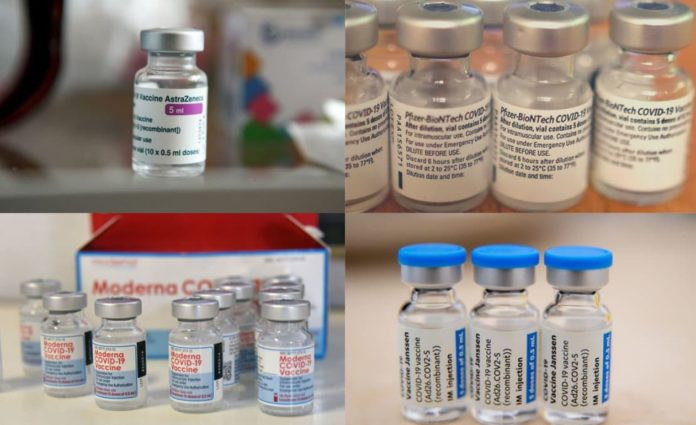A new US study suggests that Moderna’s vaccine may protect against the delta mutation of the coronavirus better than Pfizer’s. There are also initial data on the other vaccines regarding vaccination protection against the highly contagious variant.
Experts have long suspected that the effectiveness of the corona vaccines against the Delta variant could decrease slightly. The virus variant is considered more aggressive and therefore more contagious than the wild type of Sars-CoV-2.
US scientists are now delivering new data on the two mRNA vaccines from Pfizer and Moderna. And according to initial studies, the effectiveness of the vector vaccines from AstraZeneca and Johnson & Johnson is also slightly reduced.
Revyuh shows how the effectiveness of the individual vaccines against the Delta variant B.1.617.2 stands.
Moderna
According to the new US data, which scientists at the University of Cambridge have now published, the vaccine from Moderna does best against Delta.
In their study, the researchers compared the data from around 25,000 people from the US state of Minnesota three times. They had each received either the Pfizer or the Moderna vaccine. The third group was not vaccinated.
Their result: Moderna’s vaccine reduced the risk of hospital treatment for Covid-19 from January to July 2021 by 92 percent. The Moderna vaccine reduced the general risk of infection by 86 percent.
In July, however, the period in which the delta variant had increased particularly sharply in Minnesota, the general protection against infection was only 76 percent.
However, the publication has so far only been a preprint study. This means that it has not yet been reviewed by independent experts. In addition, there are statistical uncertainties that suggest that the values mentioned are initial indications, but are by no means clear evidence.
At the end of June, the US manufacturer Moderna had spoken in a statement of a “slight reduction in neutralizing titers” against the variants Delta, Gamma, Kappa and Eta.
This refers to the neutralizing antibodies that can fight off and fight the virus in the body. In the case of Delta, this reduction is 2.1-fold compared to that of the original virus strand. How high the effectiveness against Delta is, Moderna did not state in June.
This reduction is only likely to take place over time. A new laboratory study published by US researchers in the journal “Science” has now shown: The Delta variant was successfully repelled by 96 percent of the test subjects’ sera six months after the second dose.
Pfizer
In the new US study, the vaccine from Pfizer performed slightly worse than Moderna. According to the researchers, it prevented hospitalizations by 85 percent between January and July 2021. The vaccine prevented infection by 76 percent. In July, the delta period, according to the US scientists, the effectiveness was only 42 percent.
According to the study, the delta variant could have triggered this drop. However, other parameters are also missing from the preprint publication, such as the time elapsed since vaccination. This could also play a role and explain the declining effectiveness if, for example, the Pfizer vaccines were administered earlier. The vaccine had been approved before Moderna.
There are other studies that have already compared the effectiveness of the mRNA vaccines with regard to Delta. For example, in a study published in the New England Journal of Medicine, British researchers determined effectiveness of 88 percent against symptomatic Covid-19 disease triggered by Delta. According to a study by the British health authority Public Health England (PHE), the vaccine prevented hospital stays by 96 percent.
Astrazeneca
Several studies have also been published on the effects of Astrazeneca’s Oxford vaccine. In June, researchers from the British health authority Public Health England (PHE) analyzed this and published it as a preprint. Accordingly, the infection protection against the Delta variant should be around 60 percent, provided that two vaccine doses have been administered.
The risk of a severe course, however, is reduced by 92 percent.
Another study published in the “New England Journal of Medicine” found a protective effect of 67 percent with two doses of the AstraZeneca vaccine.
Johnson & Johnson
The data situation for the vector vaccine from Johnson & Johnson is less broad. The manufacturer announced at the beginning of July that the vaccine elicited a “strong” immune response against B.1.617.2. However, the company did not explain exactly how high this is.
However, a preprint study by US researchers in mid-July suggested that the effectiveness of the vaccine with regard to Delta was significantly reduced. Also because only one dose of this vaccine is given.
“The data underscore the importance of monitoring breakthrough infections that lead to severe Covid-19 and suggest the benefit of a second vaccination after Ad26.COV2.S to increase protection against the variants,” the scientists wrote.
Scientists around the world are concerned about the protection afforded by a single dose of J&J.
And the US virologist Angela Rasmussen also called on Twitter to try to get a booster vaccination if someone had been vaccinated with Johnson & Johnson for the first time. She herself received her first vaccination with the vaccine in April and therefore decided to have another vaccination with the vaccine from Pfizer.
I agree with this, given both the knowns and unknowns about the J&J vaccine. https://t.co/9Bc4fs8cBQ
— Dr. Angela Rasmussen (@angie_rasmussen) June 22, 2021
Vaccines all continue to work against delta mutation
If you look at the numerous studies on vaccination protection against the variants, it becomes clear that there is still a lack of reliable data. What is undisputed, however, is that the vaccines still provide relatively good protection despite the variants. This applies in particular to preventing serious and fatal courses.
Reports that vaccinated people also become infected or contract Covid-19 should not be unsettling. The vaccines are and never were designed to prevent infections in general. Instead, they are designed to prevent serious illness and death. And that is what they do – according to the current state of knowledge – also with the previously known Corona variants.
